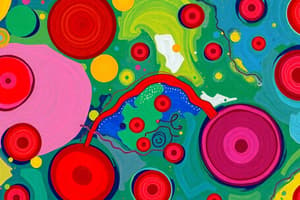Podcast
Questions and Answers
What is the primary function of haematopoiesis?
What is the primary function of haematopoiesis?
- Filtering waste from the blood
- Regulating body temperature
- Storing nutrients for energy
- Forming and developing all blood cells (correct)
Where does haematopoiesis primarily occur in adults?
Where does haematopoiesis primarily occur in adults?
- Pelvis and ribs
- Vertebrae and sternum
- Liver and spleen
- Bone marrow (correct)
What is the term for the production of blood cells outside the bone marrow?
What is the term for the production of blood cells outside the bone marrow?
- Intramedullary haematopoiesis
- Haematopoietic stem cell formation
- Blood cell differentiation
- Extramedullary haematopoiesis (correct)
At what stage of life does haematopoiesis occur in the liver and spleen?
At what stage of life does haematopoiesis occur in the liver and spleen?
What are the sites where haematopoiesis occurs called?
What are the sites where haematopoiesis occurs called?
During which stage of life does haematopoiesis occur in almost all bones?
During which stage of life does haematopoiesis occur in almost all bones?
What is the primary function of Vitamin B12?
What is the primary function of Vitamin B12?
What is the result of a deficiency in either folate or Vitamin B12?
What is the result of a deficiency in either folate or Vitamin B12?
What is the name of the pathway used by erythrocytes for energy production?
What is the name of the pathway used by erythrocytes for energy production?
What is the result of a deficiency in pyruvate kinase or G6PD?
What is the result of a deficiency in pyruvate kinase or G6PD?
What is the function of G6PD?
What is the function of G6PD?
What can lead to hemolysis in G6PD-deficient individuals?
What can lead to hemolysis in G6PD-deficient individuals?
What is the result of reduced glutathione levels in G6PD deficiency?
What is the result of reduced glutathione levels in G6PD deficiency?
What is characterized by an increased concentration of hemoglobin in the blood?
What is characterized by an increased concentration of hemoglobin in the blood?
What does an MCV of 106fl indicate?
What does an MCV of 106fl indicate?
What is the purpose of quality control in laboratory testing?
What is the purpose of quality control in laboratory testing?
What may cause a prolonged PT and APTT?
What may cause a prolonged PT and APTT?
What is the purpose of a calibrator in laboratory testing?
What is the purpose of a calibrator in laboratory testing?
What is the purpose of mixing studies, factor assays, and inhibitor assays?
What is the purpose of mixing studies, factor assays, and inhibitor assays?
What is the purpose of a Levy-Jennings curve?
What is the purpose of a Levy-Jennings curve?
What is the difference between accuracy and precision?
What is the difference between accuracy and precision?
What is the purpose of quality control samples?
What is the purpose of quality control samples?
What is the main purpose of molecular diagnostics in the context of leukaemia?
What is the main purpose of molecular diagnostics in the context of leukaemia?
What is the primary difference between acute and chronic leukaemia?
What is the primary difference between acute and chronic leukaemia?
What is the characteristic genetic mutation of Chronic Myeloid Leukaemia (CML)?
What is the characteristic genetic mutation of Chronic Myeloid Leukaemia (CML)?
What is the primary purpose of flow cytometry in diagnosing leukaemia?
What is the primary purpose of flow cytometry in diagnosing leukaemia?
What is the expected outcome of molecular testing in diagnosing leukaemia?
What is the expected outcome of molecular testing in diagnosing leukaemia?
What is the primary purpose of cytogenetics in diagnosing leukaemia?
What is the primary purpose of cytogenetics in diagnosing leukaemia?
What is the first step in diagnosing Chronic Myeloid Leukaemia (CML)?
What is the first step in diagnosing Chronic Myeloid Leukaemia (CML)?
What is the classification system used for Acute Myeloid Leukaemia (AML)?
What is the classification system used for Acute Myeloid Leukaemia (AML)?
What is the primary treatment for beta thalassemia major?
What is the primary treatment for beta thalassemia major?
What is the characteristic of red blood cells in beta thalassemia minor?
What is the characteristic of red blood cells in beta thalassemia minor?
What is the purpose of iron studies in beta thalassemia?
What is the purpose of iron studies in beta thalassemia?
What is the difference between haemoglobin S and normal adult hemoglobin?
What is the difference between haemoglobin S and normal adult hemoglobin?
What is the effect of haemoglobin S on hemoglobin function?
What is the effect of haemoglobin S on hemoglobin function?
What is the definition of haemolytic anaemia?
What is the definition of haemolytic anaemia?
What is the purpose of genetic testing in beta thalassemia?
What is the purpose of genetic testing in beta thalassemia?
What is the laboratory testing method used to detect abnormal hemoglobin variants?
What is the laboratory testing method used to detect abnormal hemoglobin variants?
Flashcards are hidden until you start studying
Study Notes
Haematopoiesis
- Haematopoiesis is the process by which all blood cells are formed and develop from hematopoietic stem cells (HSCs).
- Haematopoiesis occurs in different locations in the body depending on the stage of life:
- Embryo: Yolk sac
- Fetus: Liver and spleen
- After Birth and Throughout Life: Primarily occurs in the bone marrow
- In children, haematopoiesis takes place in almost all bones, while in adults, it is confined to the pelvis, vertebrae, sternum, and ribs.
Hematopoietic Tissues or Organs
- These sites are called hematopoietic tissues or organs.
- The bone marrow is the primary site in adults.
Extramedullary Haematopoiesis
- Extramedullary haematopoiesis refers to the production of blood cells outside the bone marrow, such as in the liver and spleen.
- This can occur in response to certain diseases or conditions that impair the marrow's ability to produce blood cells.
Schematic Diagram of Haematopoiesis
- Folate is needed for the synthesis of thymidine, a nucleotide necessary for DNA replication and cell division.
- Vitamin B12 is required for the regeneration of tetrahydrofolate, the active form of folate.
- A deficiency in either vitamin leads to impaired DNA synthesis, resulting in megaloblastic anemia characterized by the presence of large, immature red blood cells.
Red Cell Membrane
- Anemia: A condition characterized by a deficiency in the number or quality of red blood cells, leading to reduced oxygen-carrying capacity of the blood.
- Erythrocytosis: An increase in the number of red blood cells in the blood.
- Polycythaemia: A condition characterized by an increased concentration of hemoglobin in the blood, due either to a reduction in plasma volume or an increase in red cell numbers.
Energy Production in Erythrocytes
- Erythrocytes rely on glycolysis for energy production as they lack mitochondria.
- The glycolytic pathway is used, which consists of two main phases – the preparatory phase and the payoff phase.
- The pentose phosphate pathway (PPP) is also involved.
Enzyme Deficiencies and Their Effects
- Deficiencies in the enzymes of these pathways can lead to hemolytic anemia due to impaired red cell metabolism and membrane stability.
- Hereditary deficiencies include:
- Pyruvate kinase deficiency
- Glucose-6-phosphate dehydrogenase (G6PD) deficiency
Glucose-6-Phosphate Dehydrogenase (G6PD)
- Function: Catalyzes the first step in the pentose phosphate pathway, producing NADPH, which protects red cells from oxidative damage.
- Clinical implications of G6PD deficiency:
- Hemolysis: Oxidative stress from infections, certain foods, or drugs can lead to hemolysis in G6PD-deficient individuals.
Beta Thalassemia
- Severe anemia requiring regular blood transfusions and iron chelation therapy.
- Clinical manifestations include:
- Severe anemia
- Growth retardation
- Skeletal abnormalities
- Splenomegaly
- Jaundice
- Complications of iron overload from transfusions
- Laboratory test features:
- Hemoglobin electrophoresis (to detect abnormal hemoglobin variants)
- Complete blood count (CBC) with peripheral smear (to assess RBC morphology)
- Iron studies (to assess iron overload)
- Genetic testing for beta thalassemia mutations
Haemoglobinopathies
- Structure of Haemoglobin S:
- Haemoglobin S (HbS) differs from normal adult hemoglobin (HbA) by a single amino acid substitution where glutamic acid is replaced by valine in the beta globin chain.
- Effect on hemoglobin function:
- HbS tends to polymerize under conditions of low oxygen tension, causing red blood cells to become rigid and assuming a sickle shape.
Haemolytic Anaemia
- Definition: A condition where red blood cells (RBCs) are destroyed faster than they can be produced.
- Molecular diagnostics:
- Analyzes genetic material (DNA or RNA) for mutations or rearrangements.
- Techniques include polymerase chain reaction (PCR), DNA sequencing, and microarray.
Leukaemia
- Definition: Malignant proliferation of hematopoietic stem cells in the bone marrow, leading to abnormal white blood cell production.
- Acute vs. Chronic Leukaemia:
- Acute leukemia progresses rapidly and requires immediate treatment.
- Chronic leukemia progresses more slowly.
- Causes of imbalance:
- Genetic mutations
- Environmental factors
- Exposure to carcinogens
Chronic Myeloid Leukaemia (CML)
- Characterized by the Philadelphia chromosome (t(9;22)), leading to the BCR-ABL1 fusion gene.
- Classified into three phases:
- Chronic
- Accelerated
- Blast Crisis
- Classification systems for leukaemia:
- AML FAB (French-American-British) classification: Based on morphology and cytochemistry.
- ALL FAB classification: Based on cell lineage and morphology.
Laboratory Testing for Leukaemia
- Includes morphology, flow cytometry, cytogenetics, and molecular testing.
- Morphology: Examination of blood and bone marrow smears.
- Flow cytometry: Identifies cell surface markers.
- Cytogenetics: Detects chromosomal abnormalities.
- Molecular testing: Identifies specific genetic mutations.
Diagnosing Chronic Myeloid Leukemia (CML)
- Clinical presentation: Patients may present with nonspecific symptoms like fatigue, weight loss, or abdominal fullness due to splenomegaly.
- Screening tests:
- Complete blood count (CBC) with peripheral smear
- Blood chemistry tests
- Coagulation studies
- Further testing:
- Flow cytometry
- Cytogenetics
- Molecular testing
Quality Control
- Importance and definition: Quality control ensures the accuracy and reliability of laboratory test results.
- Accuracy and precision:
- Accuracy refers to how close a measured value is to the true value.
- Precision refers to the consistency of measured values.
- Levy-Jennings curve: A graphical representation of QC data over time, used to monitor the stability and performance of an assay.
- Calibrator: A substance with a known concentration used to calibrate the assay and ensure accurate measurement of unknown samples.
- QC samples: Monitor the ongoing performance of the assay, ensuring that results fall within acceptable ranges.
Studying That Suits You
Use AI to generate personalized quizzes and flashcards to suit your learning preferences.



